Okay … after a nearly six month break, I am finally starting back up on my series about the violence of God in the Old Testament. Although, … it wasn’t really a break. I was madly reading, writing, and researching that whole time … and now I think I am ready to begin again.
Ultimately, I’m trying to solve the problem illustrated here:
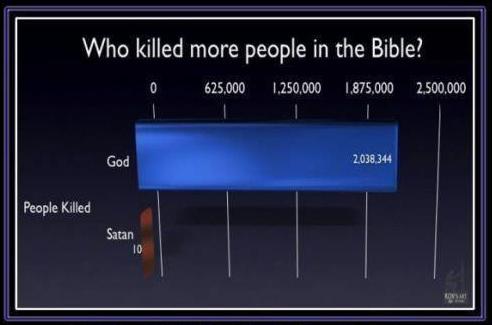
(Note: These number above don’t count the flood. Some estimate this might add anywhere between 20 million to 6 billion people to that tally.)
Since there are many new readers on this blog, and since probably everyone who has been here longer than a year has forgotten the basic argument I am trying to present, I figured I would spend one post summarizing my view and inviting people to go back and read some of what I have written previously only this topic.
Eventually, of course, these posts will make it into a book, although at this time, it looks like it will more likely be books. A normal 200 page book has about 60,000 words. So far, I have written 120,000 words on this book, and I figure I am about half-way done. Sigh.
So, either I need to cut out about 75% of what I will finally end up with, or I will have to turn this one project into three or four books. Maybe I can get it down to two.
Anyway, here is a brief introduction/summary to what I am trying to show from Scripture:
A Modest Proposal about the Violence of God in the Old Testament
If Jesus truly and fully reveals God to us, and there is no violence in Jesus, then neither is there any violence in God.
 At times God appears violent, not because He is violent, but because, just as Jesus on the cross took the sin of the world upon Himself, so also God in human history, took the violence of humanity upon Himself.
At times God appears violent, not because He is violent, but because, just as Jesus on the cross took the sin of the world upon Himself, so also God in human history, took the violence of humanity upon Himself.
Why?
For the same reason Jesus went to the cross: to rescue humanity from the devastating consequences of their actions.
Just as Jesus took sin upon Himself on the cross so that He might rescue and deliver all mankind from sin, so also God took violence upon Himself in the Old Testament so that He might rescue and deliver all mankind from violence.
Such an idea might seem scandalous to most Christians today, but this idea is no more scandalous to us than the idea to the first century Jewish person of the Messiah dying on a cross.
Read More …
If this is the first post you have read on this blog about this topic, then my proposal might come as quite a shock to you. Or maybe what I have said doesn’t make any sense. Or maybe you shrugged your shoulders and said, “Yeah? That’s what I’ve always believed.”
Whatever your reaction might be, if you want to learn more, here are some posts to get you started:
 How can a God who says "Love your enemies" (Matthew 5:44) be the same God who instructs His people in the Old Testament to kill their enemies?
How can a God who says "Love your enemies" (Matthew 5:44) be the same God who instructs His people in the Old Testament to kill their enemies?
These are the sorts of questions we discuss and (try to) answer in my online discipleship group. Members of the group can also take ALL of my online courses (Valued at over $1000) at no charge. Learn more here: Join the RedeemingGod.com Discipleship Group I can't wait to hear what you have to say, and how we can help you better understand God and learn to live like Him in this world!
Over the next two weeks, I will be publishing several more posts which attempt to unfold and explain this proposal in various ways. After that, we will dive once more into several of the violent texts of Scripture to see how the violent portrayals of God in Scripture look just like Jesus on the cross.



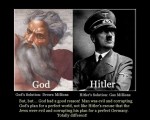
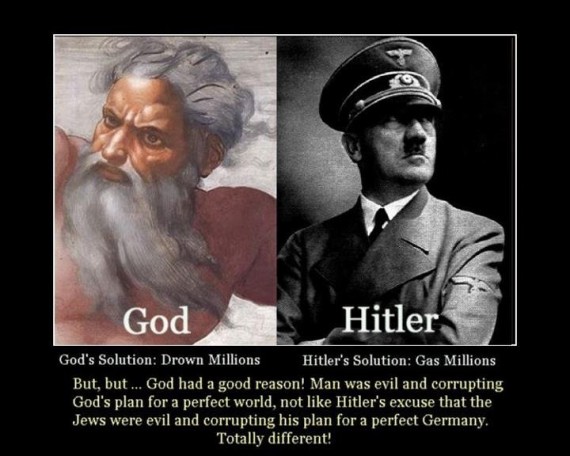

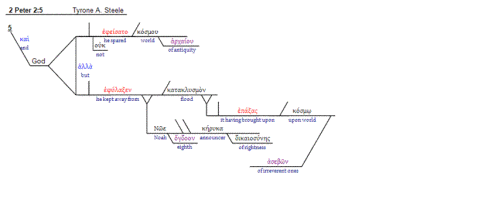 And in fact, this would be somewhat easy to do, since these first several verses of 2 Peter 2 are full of Greek participles, which are notoriously difficult to translate and understand in context. With Greek participles, there are always a host of questions about how the participle is functioning in context.
And in fact, this would be somewhat easy to do, since these first several verses of 2 Peter 2 are full of Greek participles, which are notoriously difficult to translate and understand in context. With Greek participles, there are always a host of questions about how the participle is functioning in context.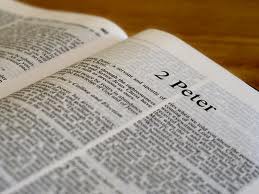 In the following verses, God is often implied to be the agent of destruction—as the one who brought the destruction, as the one who carried it out. But as 2 Peter 2:1 indicates, the reason for the destruction is quite clear: the false teachers bring this destruction upon themselves. They are the ones who brought it. They are ones to blame (2 Peter 2:1-3).
In the following verses, God is often implied to be the agent of destruction—as the one who brought the destruction, as the one who carried it out. But as 2 Peter 2:1 indicates, the reason for the destruction is quite clear: the false teachers bring this destruction upon themselves. They are the ones who brought it. They are ones to blame (2 Peter 2:1-3).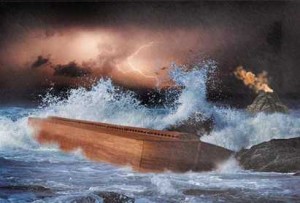 So it was in the case of the flood. When Peter writes in 2 Peter 2:5 that the flood was brought upon the people at the time of Noah, Peter uses the exact same word he uses in 2:1 to write about how the false teachers brought destruction upon themselves (Gk., epagō, “to bring upon”). The flood was brought upon the people in the days of Noah in the same way that destruction is brought upon false teachers, and chains of darkness were brought upon angels who sinned, and fire and brimstone was brought upon Sodom and Gomorrah.
So it was in the case of the flood. When Peter writes in 2 Peter 2:5 that the flood was brought upon the people at the time of Noah, Peter uses the exact same word he uses in 2:1 to write about how the false teachers brought destruction upon themselves (Gk., epagō, “to bring upon”). The flood was brought upon the people in the days of Noah in the same way that destruction is brought upon false teachers, and chains of darkness were brought upon angels who sinned, and fire and brimstone was brought upon Sodom and Gomorrah.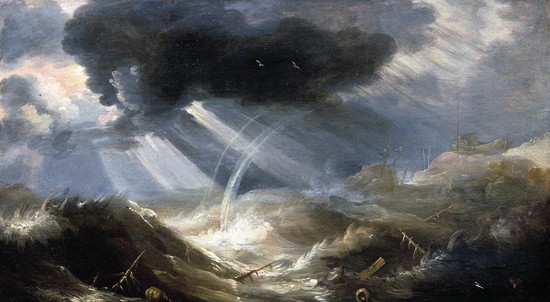

 In Isaiah 54, Israel is feeling as if they have been abandoned and scorned by God. God likens them to a woman who has borne no children, and is facing the shame and disgrace of being barren (Isaiah 54:1, 4).
In Isaiah 54, Israel is feeling as if they have been abandoned and scorned by God. God likens them to a woman who has borne no children, and is facing the shame and disgrace of being barren (Isaiah 54:1, 4). The Hebrew word translated as “spoiler” is the Hiphil participle from shachat. It could also be translated as “the destroyer” (cf. NAS, NIV, NET). More interestingly still, the Hiphil participle of shachat is also used in Genesis 6:13 and 17 in reference to the destruction that came upon the earth. By using such imagery, God explains why the flood came upon the earth: it came because the destroyer destroys. This is
The Hebrew word translated as “spoiler” is the Hiphil participle from shachat. It could also be translated as “the destroyer” (cf. NAS, NIV, NET). More interestingly still, the Hiphil participle of shachat is also used in Genesis 6:13 and 17 in reference to the destruction that came upon the earth. By using such imagery, God explains why the flood came upon the earth: it came because the destroyer destroys. This is 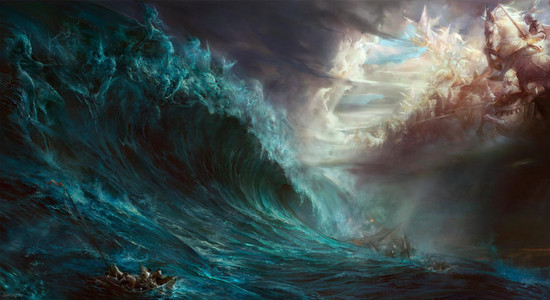

 Before Jesus came (and in fact, even today) when Jewish people read their Hebrew Scriptures and saw a violent God doing violent things, they projected this onto their expectations for what the Messiah would be and do when He finally came. They saw a violent God, and so were looking for a violent Messiah. They wanted a Messiah who would throw off Roman rule, would slay the enemies, kill the wicked, and banish all the unrighteous into eternal pits of darkness and gloom.
Before Jesus came (and in fact, even today) when Jewish people read their Hebrew Scriptures and saw a violent God doing violent things, they projected this onto their expectations for what the Messiah would be and do when He finally came. They saw a violent God, and so were looking for a violent Messiah. They wanted a Messiah who would throw off Roman rule, would slay the enemies, kill the wicked, and banish all the unrighteous into eternal pits of darkness and gloom.